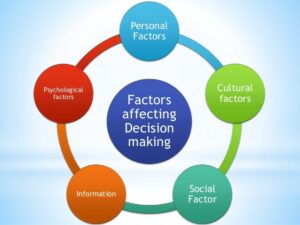Back to: Pre Vocational Studies JSS 2
Welcome to class!
In our previous lesson, we learned about the meaning and steps involved in decision making. Today, we’re going to look deeper into the specific examples of simple personal and family decisions that we encounter in everyday life.
Simple Personal and Family Decision
Personal Decisions

- What to Wear: Choosing appropriate clothing for different occasions and weather conditions. Consider factors such as the formality of the event, your personal style, and comfort level.
- What to Eat: Deciding on healthy and nutritious meals that meet your dietary needs and preferences. Consider factors such as your budget, the availability of ingredients, and your cultural background.
- How to Spend Free Time: Choosing activities that you enjoy and that align with your interests and goals. Consider options such as hobbies, sports, social activities, or personal development.
- Where to Live: Deciding on a place to live that is affordable, convenient, and meets your needs. Consider factors such as the neighborhood, schools, transportation options, and amenities.
- Career Path: Choosing a career that is fulfilling and aligns with your skills, interests, and values. Consider factors such as salary, job satisfaction, and career growth opportunities.
Family Decisions

- Where to Live: Deciding on a suitable location for your family to live, considering factors such as schools, job opportunities, cost of living, and quality of life.
- Budgeting: Creating and managing a family budget to ensure that your income meets your expenses. Consider factors such as income, expenses, savings goals, and potential emergencies.
- Childcare: Deciding on the best childcare arrangement for your children, considering factors such as cost, quality, and convenience.
- Education: Choosing schools for your children and planning for their future education. Consider factors such as academic programs, extracurricular activities, and affordability.
- Health Insurance: Selecting a health insurance plan that meets your family’s needs and budget. Consider factors such as coverage, deductibles, and premiums.
- Vacations: Planning and budgeting for family vacations. Consider factors such as destination, activities, accommodations, and budget.
Factors Influencing Decision Making

Several factors can influence personal and family decisions, including:
- Values and Beliefs: Our personal values and beliefs can shape our decisions. We are more likely to choose options that align with our values and beliefs. For example, if you value environmental sustainability, you may choose to purchase organic food or use public transportation.
- Goals and Priorities: Our goals and priorities can influence our decisions. We may prioritize certain goals over others, such as career advancement, family well-being, or financial security. For example, if your goal is to save for a down payment on a house, you may prioritize budgeting and reducing expenses.
- Resources: Our available resources, such as time, money, and skills, can limit our options and influence our decisions. For example, if you have a limited budget, you may need to prioritize essential expenses over non-essential items.
- Social Pressure: Social pressure from family, friends, or peers can influence our decisions. We may feel pressure to conform to social norms or expectations, even if it goes against our own values or beliefs.
- Emotions: Our emotions can play a significant role in decision making. Strong emotions, such as fear, anger, or excitement, can cloud our judgment and lead us to make impulsive or irrational choices.
How to Improve Decision Making
To make informed and effective decisions, it is important to:
- Gather Information: Research and gather information about the options available to you. This will help you make informed decisions and avoid making impulsive choices.
- Consider the Consequences: Think about the potential consequences of each decision and how they may affect you and your family. This will help you weigh the pros and cons of different options and choose the best course of action.
- Seek Advice: Consult with trusted friends, family members, or experts for advice and guidance. This can provide you with different perspectives and help you avoid making mistakes.
- Be Flexible: Be prepared to adjust your plans as circumstances change. Life is unpredictable, and it’s important to be adaptable and flexible in your decision making.
- Learn from Mistakes: Don’t be afraid to make mistakes. Use your past experiences to improve your decision-making skills. Reflect on your decisions and identify areas where you can improve.
Summary
Personal and family decisions are a constant part of our lives. By understanding the factors that influence decision making and developing effective decision-making strategies, we can make informed choices that align with our goals and values. Remember, there is no one-size-fits-all approach to decision making. The best approach for you will depend on your individual circumstances and preferences.
Questions
- What factors should you consider when choosing what to wear?
- How can you make healthy food choices?
- What are the benefits of engaging in hobbies and activities?
- What factors should you consider when choosing a place to live?
- How can you plan for your career path?
We have come to the end of today’s class. I hope you enjoyed the class!
In the next class, we shall be discussing the Types of household linen
In case you require further assistance or have any questions, feel free to ask in the comment section below, and trust us to respond as soon as possible. Well done so far and See you in the next class!
